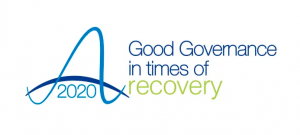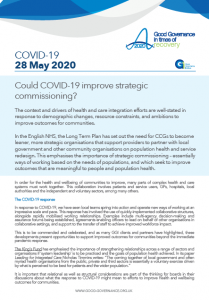Could COVID-19 improve strategic commissioning?
28 May 2020

The context and drivers of health and care integration efforts are well-stated in response to demographic changes, resource constraints, and ambitions to improve outcomes for communities.
In the English NHS, the Long Term Plan has set out the need for CCGs to become leaner, more strategic organisations that support providers to partner with local government and other community organisations on population health and service redesign. This emphasises the importance of strategic commissioning – essentially ways of working based on the needs of populations, and which seek to improve outcomes that are meaningful to people and population health.
In order for the health and wellbeing of communities to improve, many parts of complex health and care systems must work together. This collaboration involves patients and service users, GPs, hospitals, local authorities and the independent and voluntary sectors, among many others.
The COVID-19 response
In response to COVID-19, we have seen local teams spring into action and operate new ways of working at an impressive scale and pace. This response has involved the use of quickly-implemented collaborative structures, alongside rapidly mobilised working relationships. Examples include multi-agency decision-making and assurance forums being established, agreements enabling officers to lead on behalf of other organisations in collaborative settings, and support to the transfer of staff to achieve improved workforce impact.
This is to be commended and celebrated, and as many GGI clients and partners have highlighted, these developments present opportunities to support improved outcomes for communities beyond the immediate pandemic response.
The King's Fund has emphasised the importance of strengthening relationships across a range of sectors and organisations if ‘system leadership’ is to be practiced and the goals of population health achieved. In its paper Leading for Integrated Care Nicholas Timmins writes: “The coming together of local government and often myriad health organisations from the public, private and third sectors is essentially a voluntary exercise driven by what is perceived to be best for patients and the wider population.”
It is important that relational as well as structural considerations are part of the thinking for boards in their discussions about what the response to COVID-19 might mean to efforts to improve health and wellbeing outcomes for communities.
Regulators of first resort
In line with Professor Mervyn King’s views on governance, GGI has consistently advocated that boards should act as the ‘regulators of first resort’. This is echoed by Leeds CCG Chief Executive Tim Ryley in his recent article in HSJ, where he writes: “In terms of standards of care, performance management and accountability, I would unequivocally endorse the sentiment that the responsibility should belong to the board of directors at provider trusts.”
CCGs as strategic commissioners should facilitate this role for providers, and look to nurture the collaborative environment which influences wider determinants of health and wellbeing. This strategic function enables a much-needed long-term focus on outcomes and inequalities, many of which will be worsened by the impact of the pandemic.
Boards and governing bodies now have an important role in supporting local teams to assess what recent developments demonstrate evidence of success and might be sustainable, and the ways in which these will be resourced within ‘recovery’ and ‘reset’ efforts.
Those with the privilege and responsibility of sitting in the boardroom (or board Zoom, as the case may be) should be seeking assurance as to how successful collaboration in the COVID-19 response might be adapted and maintained for the long-term benefit of the communities they serve.
Time to reflect
These bulletins are intended to provide reflections that help health and care leaders to gather insight and strengthen assurance. In relation to strategic commissioning and COVID-19, boards and governing bodies may wish to consider the following questions:
- What revisions to local needs assessments and population health outcome targets are required due to the impact of COVID-19?
- How are boards and governing bodies being assured in relation to the evidence base for maintaining working arrangements that have been established in response to the pandemic?
- Are boards and governing bodies taking time to reflect on partnership working and new improved relationships that have developed in response to COVID-19?
- How are boards and governing bodies taking a system-wide approach to learning and quality improvement as the ‘regulator of first resort’ within efforts to reset the health and care system for the future?
GGI is keen to hear examples of collaboration that have been established in response to COVID-19, or board discussions on whether and how these collaborative efforts might be sustained. If you have examples to share, or if this briefing prompts any other questions or comments, please call us on 07732 681120 or email advice@good-governance.org.uk.

Donal Sutton
Strategy Director

